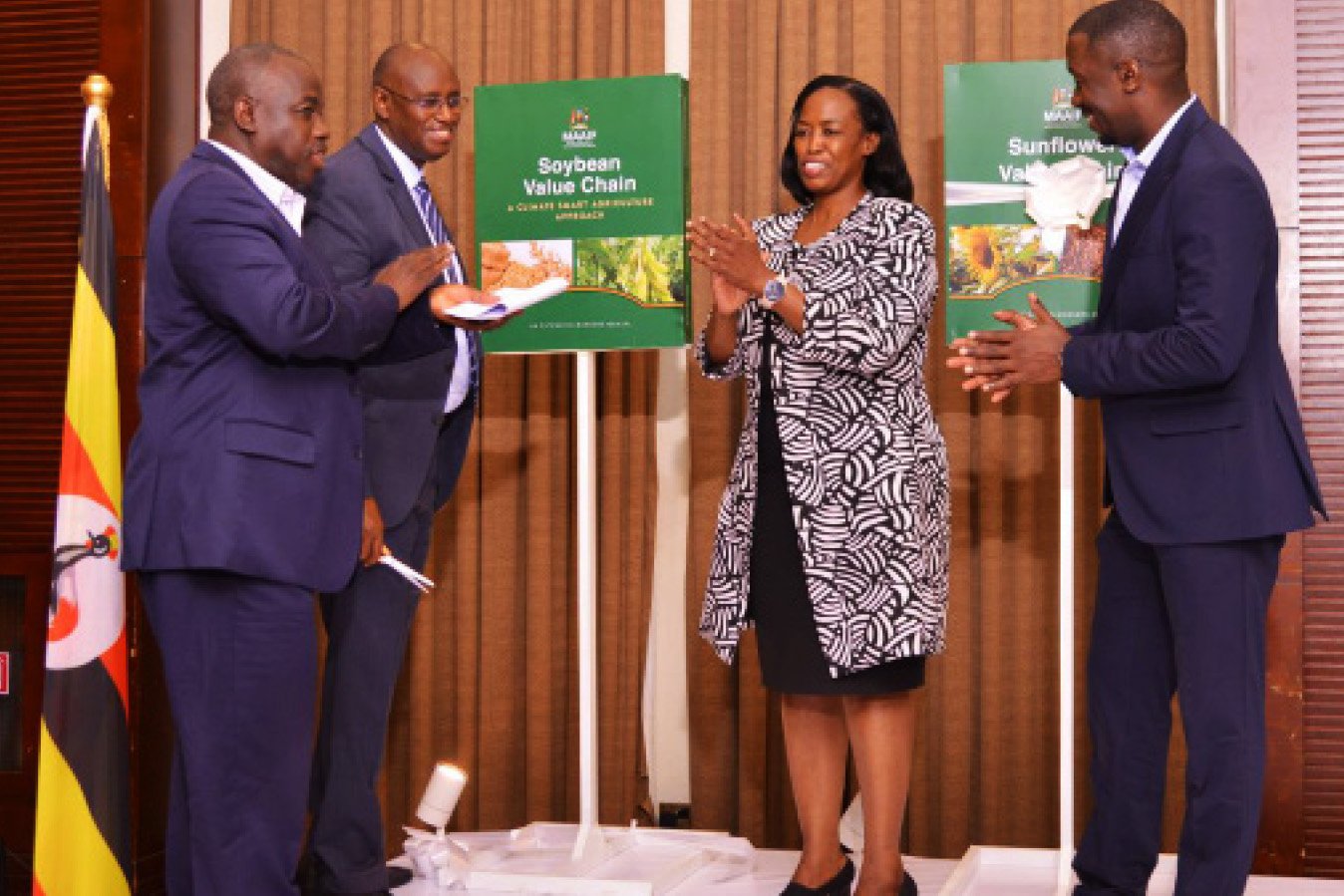Prime
Maaif launches climate change adoptive extension manuals

Minister of State for Agriculture, Mr Fred Bwino Kyakulaga (second left) launches the extension value chain manual at Serena Hotel. Photo/George Katongole.
What you need to know:
- A new set of manuals will provide guidelines and best practices for Ugandan farmers of potato, sunflower, soy bean and sesame with the potential to revitalise economies while revolutionising value-chain actors.
The Ministry of Agriculture, Animal Industries and Fisheries (Maaif) has launched a climate-smart agricultural extension manual at Serena Hotel to help the sector withstand challenges brought by climate change.
Climate change has significant implications on agriculture, food security, soil and water resources and the livelihoods of people.
The Food and Agriculture Organization of the United Nations (FAO) estimates that, by 2050, some 50 percent more food will be needed to satisfy the extra demand compared to 2013.
The challenges posed by rapid growth in food demand are intensified by the effects of climate change on agricultural systems, including crops, livestock, forestry and fisheries.
Globally, the effects of climate change will vary by region and country and will affect people differently depending on their vulnerability and capacity to adapt.
Some areas are expected to become drier and more drought-prone, while others will witness more intense rains or altered rainfall patterns. Increasing temperatures will change the length of the growing seasons and affect yield in some areas. This added variability changes the conditions in which agriculture is practiced and requires context and site-specific strategies and responses.
Adaption
To meet these challenges, agricultural production and food systems need to undergo a profound transformation. Such a transformation will involve a variety of stakeholders along the agricultural supply chains and at policy levels.
Food producers will have to adapt their farming system techniques in the context of new climate conditions, and increasingly limited natural resources, while at the same time reducing GHG emissions.
For this reason, the Ministry of Agriculture has released climate-smart farming manuals for extension workers during a ceremony at Serena Hotel in Kampala. The manuals are designed to link agricultural production and food security to climate change adaptation and mitigation, in order to guide the production of potato, sunflower, soy bean and sesame in Uganda.
The manual is meant to harmonise the available information and effectively disseminate it to farmers in order to appropriately respond to effects of weather and climate variability.
Partnerships
Technical staff from MAAIF with support from SNV Netherlands Development Organisation and other technical persons from research, academic institutions and farmer representatives, developed the manuals to promote a Climate-Smart Agriculture in the production of potato, sunflower, soy bean and sesame.
The team envisages that these manuals will provide suitable and up-to-date information along the value chain of the four commodities.
Phomolo Maphosa, the SNV Country Director said those crops have been at the heart of the “Resilience Agribusiness for Tomorrow). She says that the selected crops can promote resilience while helping farmers have more incomes.
“If you look at and climate change and the varieties farmers can plant, you can see that we have shorter variety seeds. The farmers are able to cope by having crops that can mature in a short period of time,” Maphosa says.
This manual takes the farmers through the basics of climate science to the impacts of climate change and the linkages among climate, agriculture and food security. The content of this manual has been developed and tested through fieldwork involving extension agents and agricultural producers in Uganda.
By 2030, temperatures in Uganda are projected to rise by up to 2°C. This increase in temperature has far-reaching consequences, threatening to disrupt agricultural productivity, shorten growing seasons, and jeopardise water resources. Moreover, the essence of crops is under siege as pests change their habitats in response to these climatic shifts.
Minister of State for Agriculture, Mr Fred Bwino Kyakulaga, who presided over the event said that farmers must be helped as quickly as possible.
“Because of this vulnerability, we have to create resilience to make sure that we survive against extreme weather and harsh weather conditions such as landslides and floods, the timing of farming has to be guided,” said Kyakulaga.
Behavioural changes
The manuals provide comprehensive information across the entire value chain of each crop – from planting and cultivation techniques to post-harvest management and market access.
“We must change the way of doing things. We must be aware now that it is not an option to irrigate or use fertilisers in farm operations. We cannot depend on rain-fed agriculture anymore. Equally, land is shrinking and the population is growing. So, we have to improvise more scientific way of producing,” Kyakulaga adds.
Joseph Okee, the Senior Agricultural Extension Coordinator Maaif says farmers must embrace behavioural changes for climate-smart practices.
Uganda has six agro-ecological zones with drought and floods having the highest impact on crop production. Coping strategies towards extreme events included storing food, income diversification and digging drainage channels.
Other strategies were planting trees; high-yielding, early-maturing, drought-tolerant, disease and/or pest-resistant varieties; early planting at onset of rains; increased pesticide/fungicide application among others.
“Climate-smart farming is highly specific. A good agricultural practice that works elsewhere may not work properly in Uganda,” Okee says.




